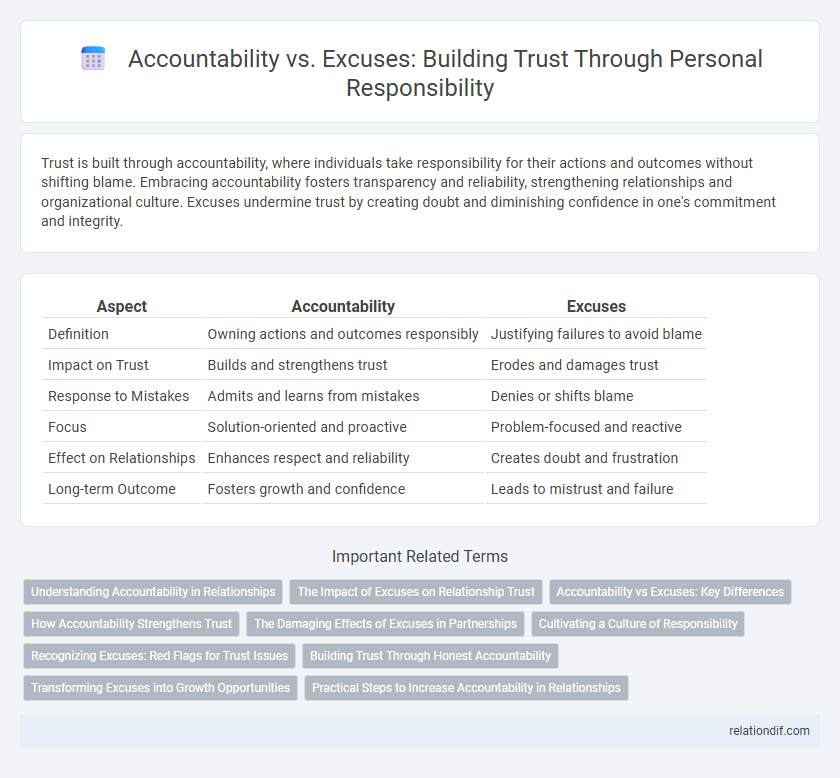Trust is built through accountability, where individuals take responsibility for their actions and outcomes without shifting blame. Embracing accountability fosters transparency and reliability, strengthening relationships and organizational culture. Excuses undermine trust by creating doubt and diminishing confidence in one's commitment and integrity.
Table of Comparison
| Aspect | Accountability | Excuses |
|---|---|---|
| Definition | Owning actions and outcomes responsibly | Justifying failures to avoid blame |
| Impact on Trust | Builds and strengthens trust | Erodes and damages trust |
| Response to Mistakes | Admits and learns from mistakes | Denies or shifts blame |
| Focus | Solution-oriented and proactive | Problem-focused and reactive |
| Effect on Relationships | Enhances respect and reliability | Creates doubt and frustration |
| Long-term Outcome | Fosters growth and confidence | Leads to mistrust and failure |
Understanding Accountability in Relationships
Understanding accountability in relationships means recognizing personal responsibility for actions and their impact on others, fostering trust and emotional safety. Accountability involves honest communication, admitting mistakes, and making amends without shifting blame or offering excuses. Emphasizing accountability enhances relationship resilience and deepens mutual respect.
The Impact of Excuses on Relationship Trust
Excuses erode relationship trust by creating doubts about reliability and responsibility, leading to weakened emotional bonds and increased skepticism. When accountability is replaced by excuses, it signals a lack of integrity and commitment, diminishing confidence in future interactions. Consistent accountability fosters transparency and trust, ensuring stronger connections and mutual respect.
Accountability vs Excuses: Key Differences
Accountability involves taking responsibility for actions and outcomes, fostering trust through transparency and reliability. Excuses often deflect blame and hinder problem-solving, eroding confidence and damaging relationships. Understanding these key differences is crucial for building a culture of trust and effective communication.
How Accountability Strengthens Trust
Accountability fosters trust by ensuring individuals take responsibility for their actions and decisions, creating a reliable foundation that others can depend on. Transparent acknowledgment of mistakes encourages open communication, reducing uncertainty and strengthening relationships. This consistent behavior builds credibility, making trust more resilient and enduring within teams and organizations.
The Damaging Effects of Excuses in Partnerships
Excuses erode trust in partnerships by creating doubt about reliability and commitment, ultimately weakening collaboration and shared goals. Accountability fosters transparency and responsibility, essential for building strong, long-lasting partnerships. Persistent excuses damage communication channels and hinder problem-solving, leading to fractured relationships and decreased mutual confidence.
Cultivating a Culture of Responsibility
Cultivating a culture of responsibility within organizations strengthens trust by prioritizing accountability over excuses and promoting transparency in decision-making. Employees who embrace accountability contribute to a reliable work environment where challenges are addressed proactively, fostering continuous improvement and resilience. Clear expectations and consistent feedback mechanisms reinforce personal ownership, driving ethical behavior and organizational success.
Recognizing Excuses: Red Flags for Trust Issues
Recognizing excuses such as inconsistent explanations, frequent blame-shifting, and vague commitments signals potential trust issues in relationships. Accountability is marked by owning mistakes openly, providing clear reasons for actions, and demonstrating a commitment to corrective measures. Identifying these red flags helps maintain integrity and fosters a trustworthy environment.
Building Trust Through Honest Accountability
Building trust through honest accountability requires consistently owning mistakes and transparently communicating corrective actions to stakeholders. Organizations that prioritize responsibility over excuses foster stronger relationships and enhance credibility with clients, employees, and partners. Emphasizing a culture of accountability cultivates long-term trust and drives sustainable success.
Transforming Excuses into Growth Opportunities
Accountability strengthens trust by encouraging individuals to take responsibility for their actions instead of making excuses that hinder progress. Transforming excuses into growth opportunities involves recognizing mistakes, learning from them, and implementing strategies for improvement. This mindset shift fosters a culture of transparency and continuous development, essential for building lasting trust within teams and organizations.
Practical Steps to Increase Accountability in Relationships
Establish clear expectations and regularly communicate to build accountability in relationships, ensuring both parties understand their roles and responsibilities. Implement consistent follow-ups and feedback loops to address issues promptly and prevent excuses from undermining trust. Encourage taking ownership by modeling transparency and admitting mistakes, fostering a culture where accountability strengthens emotional bonds.
Accountability vs Excuses Infographic

 relationdif.com
relationdif.com